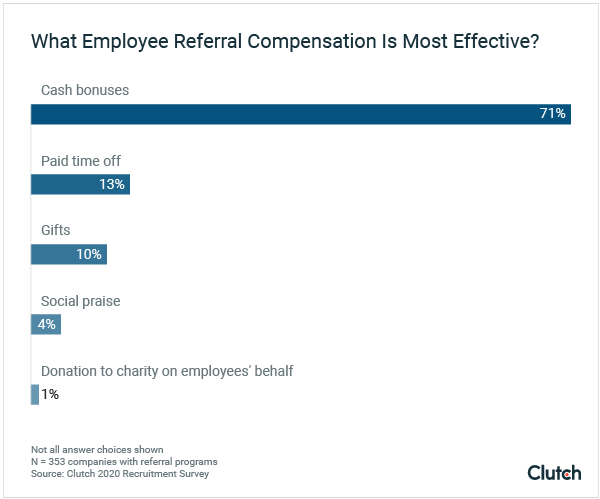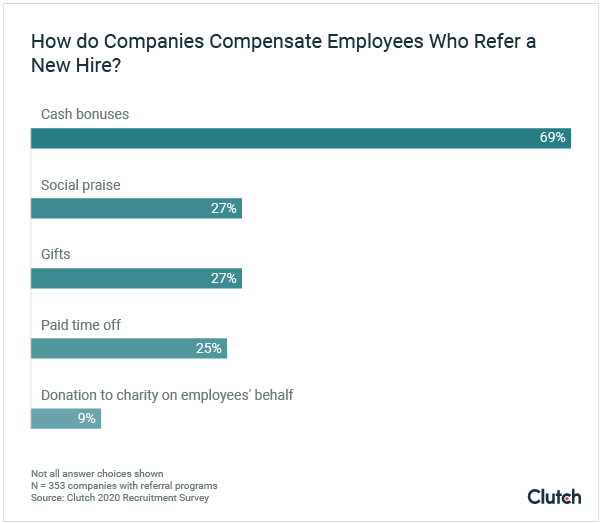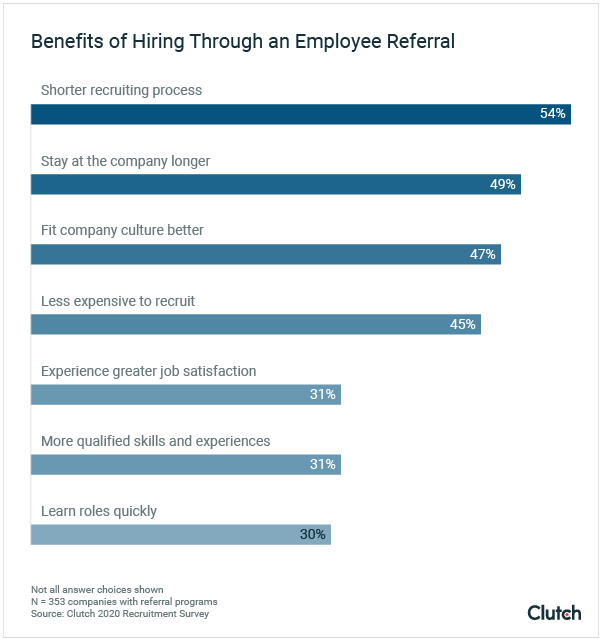

Updated January 2, 2025
Companies with employee referral programs are more likely to hire the best possible employees, according to our survey of 353 recruitment professionals. Businesses should provide cash bonuses and social praise to hire effective workers quickly who will fit their company’s culture.
Economic uncertainty surrounding the coronavirus pandemic has left many businesses with smaller recruiting and hiring budgets.
Despite the uncertainty, companies in many industries — especially tech, food, medicine, and supply chain services — still need new employees.
Looking for a Human Resources agency?
Compare our list of top Human Resources companies near you
Fees that recruiting agencies charge can be costly, and the time necessary to find and actively recruit potential candidates can be prohibitive.
For affordable and effective hiring, companies should implement an employee referral program.
We surveyed 353 recruitment professionals whose companies offer an employee referral program to learn what makes referrals effective and what the biggest benefits of referrals are for their business.
Businesses should award cash bonuses and social praise to employees who participate in an employee referral program to hire effective and engaged people.
There are many ways for companies to compensate employees who refer job applicants for openings at their company, but money compensation is the most successful.
Close to three-quarters of companies (71%) believe that cash bonuses are the most effective employee referral compensation.

In comparison, 13% of businesses believe that additional time off is the most effective compensation reward. Only 10% believe that gifts are the most effective, and 4% say social praise.
Experts say that companies’ belief in cash bonuses for employee referrals is unsurprising: This practice is widespread and generally effective.
In the tech and financial industries, for example, large companies such as Google and Ernst & Young sometimes offer up to $10,000 to employees who refer new hires.
Cash compensation doesn’t have to be limited to large companies — smaller companies such as Voices.com, an online marketplace that connects businesses with professional voice talent, also rewards cash bonuses to employees who refer new hires.
Even for companies with more modest budgets, cash bonuses for referrals are achievable. For example, Voices.com offers a $300 bonus to referring employees.
“We believe that top talent knows other top talent,” CEO David Ciccarelli said. “The referral program is tremendously helpful for finding the right person for a job.”
The referral program is tremendously helpful for finding the right person for a job.
Ciccarelli safeguards the employee referral process by waiting to pay referring employees until the new hire has completed 90 days of work. This way, the company has time to ensure the new hire is there to stay.
For Voices.com, cash bonuses provide a tangible and valuable benefit to employees who refer their colleagues. For all businesses, cash bonuses for referrals:
Whatever combination of rewards businesses decide to provide referring employees, those that can afford it should consider starting with a basic cash bonus.
Cash bonuses may be the most prominent and widespread compensation for employees to refer new hires, but they do not have to stand alone. Business owners and managers should publicly and prominently provide social praise to employees who refer new hires, especially if their business is looking to limit expenses in the COVID-19 economic climate.
Although companies are most likely to compensate employees who participate in referral programs with cash bonuses (69%), roughly one-quarter of companies offer social praise (27%), gifts (27%), or extra time out of the office (25%).

In addition to cash bonuses, companies should offer shoutouts and public praise to employees who refer new hires.
At smaller companies, employees naturally earn recognition by referring hires.
Saurabh Jindal, the founder of Talk Travel, a voice services mobile application for travel-related queries, says that simply thanking employees who refer new hires in front of their colleagues is enough to keep the team at his small startup referring their friends and associates.
At larger companies, social praise needs to be more explicit. Businesses can provide social praise by:
By pairing modest cash bonuses with prominent social praise, companies can incentivize referrals and make the importance of referrals clear to employees.
No matter the money compensation, companies that reward employees who refer new hires should use social praise.
The average length of the hiring process can vary widely for companies in different industries and different locations.
Regardless of the length of a company’s recruiting process, companies should plan to shorten their timeline for a candidate who applies as part of a referral program.
Already, close to half of companies (46%) spend 1 month or less on their hiring process.

Companies with a hiring process longer than 1 month may be at a recruiting disadvantage that employee referrals can help reduce.
Experts say that employee referral programs can significantly shorten the length of a company’s hiring process, as time spent on preliminary phone interviews and basic background checks is reduced.
Ollie Smith, CEO of Card Accounts, a payment data merchant service provider, said he hires referred candidates twice as fast.
Smith has hired two employees since instituting an employee referral program. Because someone has already vouched for the candidate, Smith spends less time calling references. In both cases, a 4-5 week hiring process was reduced to 2 weeks.
Referral programs help speed up the process of turning applicants into employees.
Businesses can demonstrate their commitment to making faster, better hiring decisions with an effective referral program.
It’s natural for companies to want to reduce the amount they spend on hiring, especially in the current economic climate. For most positions, the overall cost of hiring new employees is between $3,000 and $5,000.
Employee referral programs are a simple and effective way for companies to decrease the significant costs associated with hiring new employees.
More than half of companies (55%) say employee referral programs reduce the cost of hiring.

Referral programs reduce or eliminate a range of costs, including:
Experts say the costs cut through employee referral programs can be significant.
Anna Papalia, CEO of ShiftProfile, an interviewing consultancy, said that in her career as an HR and staffing consultant, she relied on employee referrals.
In one position, she was responsible for recruiting and hiring $7.2 million in yearly salary.
“We relied heavily on a generous employee referral program and leveraging our internal networks,” Papalia said. “I believe one of the best and most reliable talent pipelines is a referral program.”
By eliminating nearly all recruiter fees, Papalia estimates that the referral program for this staffing project alone saved her company upwards of $1 million.
Companies should implement strong employee referral programs to save money on recruiting, no matter if they are working with a large or small staffing budget.
Companies value candidates who seem likely to work at the company for an extended period of time. Employee referral programs are an effective strategy to reduce employee turnover.
About half of businesses (49%) say hires who employees refer generally stay at the company longer.

Meanwhile, fewer than one-third of businesses believe that referred hires are likely to experience greater job satisfaction (31%), have more qualified skills and experiences (31%), and be more productive in their jobs earlier in their tenure (30%).
Experts say employee referral programs reduce turnover for two reasons:
Joey Price, CEO of Jumpstart HR, an outsourcing and small business consultancy for small businesses and startups, says he usually attributes the lower turnover of referred employees to the bonds they have with their coworkers.
“It's likely that an employee who is referred already has a close connection with the person who referred them,” Price said. “Working with people you like is important because you're more open to positive and constructive feedback, attempts at team building, and buying into corporate vision.”
Companies who want happy, productive, and long-lasting hires find employee referral programs a worthy investment.
Businesses should use employee referral programs to hire more selectively and effectively, especially given the economic uncertainty caused by the coronavirus outbreak.
Businesses can use employee referral programs to hire talent that is effective and more likely to remain at the company long-term.
Companies that implement an employee referral program should:
Businesses are most likely to make the best hiring decisions when they use an employee referral system.
Clutch surveyed 353 full-time employees in the U.S. whose company has an employee referral program.
Twenty-three percent (23%) live in the Midwest; 21% in the Northeast; 29% in the South; and 20% in the West.
Seventy-two percent of respondents (72%) are female, and 28% are male.
Thirty-five percent (35%) of respondents are ages 18-34; 53% are ages 35-54; and 12% are 55 years old and above.


